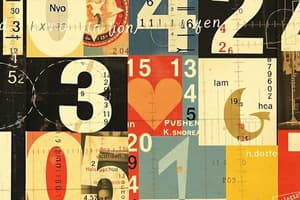Podcast
Questions and Answers
ما هو نتيجة ضرب أي عدد صحيح في 0؟
ما هو نتيجة ضرب أي عدد صحيح في 0؟
- نسمة
- صفر (correct)
- 1
- غير معروف
ما هو نتيجة ضرب 48 في 25؟
ما هو نتيجة ضرب 48 في 25؟
- 2400
- 1200
- 480
- 4800 (correct)
ما هو نوع الرقم الذي نحصل عليه عندما نرمز عدد صحيح في كسر؟
ما هو نوع الرقم الذي نحصل عليه عندما نرمز عدد صحيح في كسر؟
- كسر
- رقم смешن (correct)
- عدد صحيح
- رقم عشري
ما هو نتيجة ضرب رقمين سالبين؟
ما هو نتيجة ضرب رقمين سالبين؟
ما هو نوع الرقم الذي نحصل عليه عندما نرمز عدد صحيح في رقم عشري؟
ما هو نوع الرقم الذي نحصل عليه عندما نرمز عدد صحيح في رقم عشري؟
Flashcards are hidden until you start studying
Study Notes
Whole Numbers and Multiplication
Whole numbers are the set of numbers starting at zero and increasing by one each time. They are positive integers and are not inclusive of fractions, decimals, or negative numbers. Whole numbers are the building blocks for understanding multiplication.
Multiplication of Whole Numbers
Multiplication is the process of finding the product of two numbers. In the context of whole numbers, multiplication is the process of finding the total quantity when an object or group is repeated a certain number of times. For example, if we have 3 apples and we multiply it by 4, we would have 12 apples in total.
Associative Property of Multiplication
The associative property of multiplication states that the order in which you multiply does not change the result. This means that the expression a * (b * c) is equal to (a * b) * c.
Commutative Property of Multiplication
The commutative property of multiplication is similar to the associative property, but it applies to the order of the numbers being multiplied. It states that the expression a * b is equal to b * a.
Distributive Property of Multiplication
The distributive property of multiplication states that for any set of numbers a, b, and c, a * (b + c) is equal to (a * b) + (a * c).
Multiplication of Whole Numbers with 9, 99, and 999
There are patterns in multiplication with whole numbers like 9, 99, and 999. For example, 62 * 9 is equal to 62 * (10 - 1), which simplifies to 558. Similarly, 62 * 99 is equal to 62 * (100 - 1), which simplifies to 6138.
Multiplication of Whole Numbers with 5, 25, and 15
There are also patterns in multiplication with whole numbers like 5, 25, and 15. For example, 48 * 5 is equal to 48 * (10 / 2), which simplifies to 480. Similarly, 48 * 25 is equal to 48 * (100 / 4), which simplifies to 4800.
Multiplication of Whole Numbers with 0
The result of multiplying any whole number by 0 is 0.
Multiplication of Whole Numbers with Negative Numbers
The result of multiplying a whole number by a negative number depends on the signs of the numbers. If both numbers are positive, the result is positive. If one number is positive and the other is negative, the result is negative. If both numbers are negative, the result is positive.
Multiplication of Whole Numbers with Fractions
Multiplication of whole numbers with fractions results in a different type of number, called a mixed number or a fraction. For example, multiplying 3 by the fraction 1/4 would result in the mixed number 7/4 or the fraction 11/4.
Multiplication of Whole Numbers with Decimals
Multiplication of whole numbers with decimals results in a different type of number, called a decimal. For example, multiplying 3 by the decimal 0.2 would result in the decimal 0.6. If the decimal being multiplied has more digits than the whole number, the result would be a decimal with more digits.
Multiplication of Whole Numbers with Integers
Multiplication of whole numbers with integers results in another type of number, called an integer. Integers can be positive or negative whole numbers.
In conclusion, multiplication is a fundamental operation in mathematics that is essential for understanding whole numbers and their properties. Understanding the properties of multiplication, such as the associative and commutative properties, the distributive property, and the patterns in multiplication with certain whole numbers, can help simplify calculations and make multiplication easier.
Studying That Suits You
Use AI to generate personalized quizzes and flashcards to suit your learning preferences.




